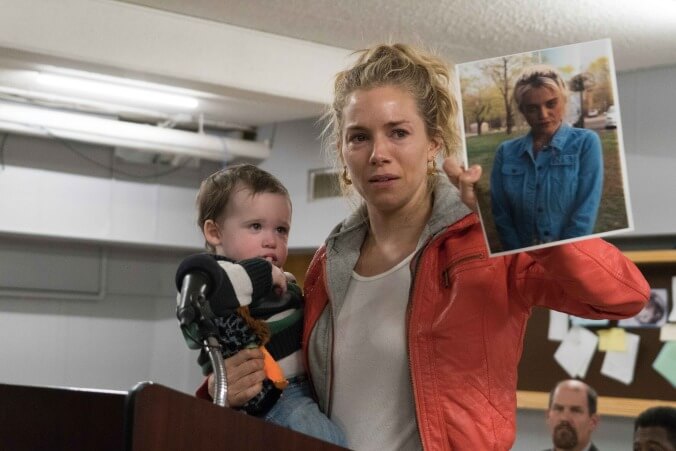In rural Pennsylvania, 31-year-old Deb Callahan (Miller) is caught in a self-destructive pattern. She lives with her teenage daughter Bridget (Sky Ferreira) and her baby grandson Jesse in a house across the street from her older sister, Kath (Christina Hendricks), who married her high school sweetheart and settled down with two sons. There’s animosity on both sides: Kath judges Deb for dating a married man, while Deb refuses to accept Kath’s opinions on her life. Raunchy, rebellious, and loud, Deb roils with a deep anger—at the man who left her alone with a child; at her father, who died and left her mother alone to raise two girls; at the boy who got Bridget pregnant and won’t help out; and at the man she’s sleeping with, who won’t leave his wife.
This hard life eventually freezes into tragedy when Bridget goes missing one night, never returning from a date with Jesse’s father, Tyler (Alex Neustaedter). There are two paths forward for Deb: continuing to fight to find Bridget, knocking on every door and tapping every resource to make sense of what happened to her daughter, or accepting that Bridget might not come back and that other immediate concerns—raising Jesse, supporting them financially, finding a father figure for her grandson—require different approaches than what Deb might have provided before Bridget’s disappearance. Who she was before she lost Bridget and who she was after are essentially two different people, though both contain multitudes, defined by their roles within the family (mother, grandmother, wife) and outside of it (mistress, graduate, professional partner).
American Woman’s depiction of rural life incorporates sexist and classist realities (abusive male partners, stifled job prospects), and acknowledges that it’s often women who provide support networks for each other, shared experience informing their relationships to each other, their partners, and their children. (The film easily passes the Bechdel Test, though it’s otherwise not the most diverse vision of the American country.) Hendricks and Miller have more to work with here than they’ve typically been given in supporting roles over their respective careers. Their sisterly dynamic effectively ranges from fiercely protective to amusingly mischievous; a scene where they go on a double date and then insult each other while talking on the phone in their respective homes is affectionate and rings with authenticity.
Scott, for his part, incorporates recurring imagery to relay Deb’s growth over time. In her first moments of grief, she smashes her body upon her married boyfriend’s, grasping for his hands over and over again as he increasingly tries to extricate himself. Years later, it is Kath who reaches for Deb, a rare moment of emotional generosity from her older sister. The passage of time is handled smoothly by editor Joi McMillon, production designer Happy Massee, and set decorator Danica Chipman. We see Deb’s home become cleaner and more orderly, Deb and Kath inch closer together (physically as well as emotionally), and Jesse grow up. (He’s played at 7 by Aidan McGraw, as a teenager by Aidan Fiske.)
American Woman sometimes buckles under the weight of its subject matter. Subplots clearly engineered to convey the cyclical nature of life take a little too long to get their point across. And there is a question of whether the Bridget’s disappearance was the best turning point it could have devised. Could this narrative have worked without a plot element that cuts a young woman’s life short? In the film’s consideration of grief, it makes space for Deb’s growth, but sometimes the movie treats this like a trade—as if one woman’s life can only flourish after the destruction of another’s. At its best, though, American Woman brings to mind Erin Brockovich or 20th Century Women or Gloria Bell: films about how the constraints of gender, class, and age push down upon a woman in myriad ways. And Miller finally gets the chance to demonstrate what she can do as a proper protagonist, breaking away from the stereotypes she’s too often played.


